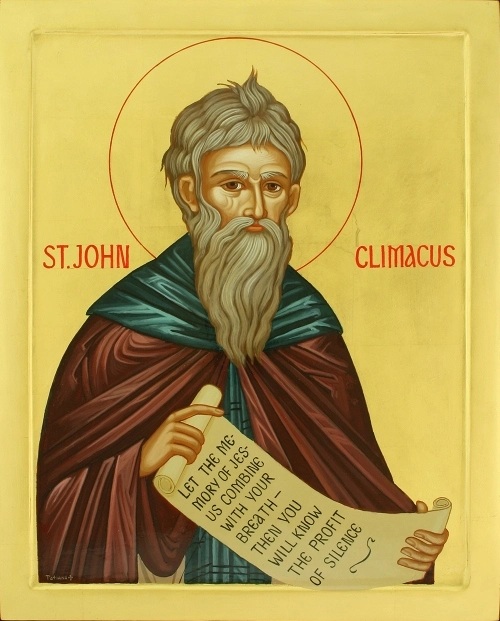- Home
- About us
- Students
- Courses
- Research
- Library
- News & Events
- Gallery
- Contact
- Our Blog
Latest News

St John Climacus: Some Cursory Reflections on
The Ladder of Divine Ascent

by Assoc. Professor Philip Kariatlis (Sub-Dean)
The Fourth Sunday of Holy and Great Lent is dedicated to St John of the Ladder, an ascetic saint of great eminence in the life of the early Church (6th-7th centuries), and author of one of the greatest classics of Christian spirituality, The Ladder of Divine Ascent. It is a work which is not only read in monasteries today but is equally loved and has been embraced by the Orthodox faithful throughout the world more broadly, and indeed throughout all time—a work most relevant for all those seeking to personally encounter the love of Christ in their life.
Although specifically written for a monastic audience, this consummate work provides a kind of ‘roadmap’ for all those seeking Christ. It describes the various stages of our ‘life in Christ’ in an acutely tangible way, namely in terms of the rungs of a ladder that we are called to ascend. At the same time, it is profoundly sensitive to the reality of the fallen human condition, and in the end is intensely determined to stir the hearts of its readership to move forever upwards into the presence of Christ. “Ascend, ascend” the saint writes, “run eagerly upwards together with Christ.”
More specifically, the text is structured as a metaphorical ladder with thirty rungs, each representing a virtue or struggle that a monk must overcome to attain divine union. Among these virtues, love and humility are two of the most significant and recurrent themes, playing an important role in spiritual growth; indeed, these are considered the very foundation upon which all other virtues are built. Without love humility, St John of the Ladder will argue, one cannot truly progress in the spiritual life. He presents these two virtues as both a beginning and an end—something that must be cultivated at the outset of one’s spiritual journey but also deepened as one matures in faith, looking towards the end goal.
Beyond depicting the Christian life as an ascent into our Lord’s heavenly kingdom—with humility and love fairing most pre-eminently—this work equally identifies the manifold difficulties and challenges that we will inevitably confront in the ascent towards Christ. For St John of the Ladder, these hurdles are the passions—which are described as ‘misdirected virtues’—and which we all inevitably experience in this life, often tending to sway us away from our ultimate goal, who is Christ and God’s heavenly kingdom.
Some of the passions identified in the book, which need to be overcome so that we can return back onto the way leading to a relationship with Christ—as opposed our feeble self which leads to demise and death—are anger, malice, slander, avarice and pride. For St John, these are all human proclivities overtly focused on the self, and therefore by definition make us indifferent to the presence of God or those around us. Ultimately, they restrain us and hold us back from receiving the liberating gifts of the resplendent light and enduring life of Christ.
And yet at the same time, in reading this work, what becomes explicitly obvious, is the saint’s earnest desire that we all move beyond these human obsessions so that we can come to experience the unwavering, uncontainable and unending love of Christ. Indeed, the saint is forever enjoining us in The Ladder to embark upon the difficult and toilsome road of reciprocating the love with which Christ loved us first.
Indeed, as already mentioned, love, together with humility are the two irreducible poles around which the entire Christian life is to be understood—namely, a way of life where we grow in our love towards God, evidenced in our heightened ardour and love to those around us and God’s creation more broadly. But for this to happen, humility must be cultivated if we are going to be enabled to look beyond our feeble self in order to love God and those around us. It is for this reason, that the saint points out: “Repentance lifts a person up. Mourning knocks at heaven’s gate. Holy Humility opens it.” Indeed, it is this spark of divine love and humility that we are all invited, during this fourth Sunday of Great Lent, to receive into our life at this point of the journey in preparation for our encounter with Christ during Holy and Great week.
Humility, specifically, for St John Climacus, is not merely an external posture but an inner disposition. It is the recognition of one’s dependence on God, a complete surrender of pride, an acknowledgment of one’s own limitations and weaknesses and the realisation of the amazing extent of God’s undeserved love towards us. He writes that humility is the realisation that “the very abundance of God’s gifts to us is so much in excess of what we deserve… Hence [in such a state of humility] our minds remain secure, locked up in the purse of modesty.” He contrasts humility with pride, which he describes as the greatest obstacle to spiritual progress. Pride, vainglory and self-conceit, blind a person to their own faults, whereas humility allows for self-awareness and repentance.
In light of the difficulty of the road ahead, St John of the Ladder reminds us that this journey cannot in any way be travelled by our own efforts and in a spirit of self-sufficiency; but only by the grace of God. Learning the way of self-effacing love and humility—that is, love for God and those around us, a love which can best be summed up as a way of life focused on the ‘other’ together with a humble predisposition—requires much work, since we often tend to blatantly—and for that matter, shamelessly—focus almost exclusively on ourselves and our needs, thus separating ourselves from God, and equally so, making ourselves indifferent to His creation more broadly. These are gifts from God which we must endeavour to seek in our life.
Moreover, St John of the Ladder does not present humility as an abstract concept but as something lived out in daily life. Some of the practical expressions of humility he outlines include:
- Silent Endurance of Insults: A humble person does not react angrily when insulted but accepts humiliation as a means of spiritual growth. In this regard, he writes: “Humility is the rock which is placed against the waves of insults, and it remains unmoved.”
- Gentleness and Understanding towards Others: True humility is demonstrated in our kind disposition towards others: “The person with humility for his bride will be gentle… sympathetic, calm in every situation, radiant, easy to get along with…”
- Acknowledging One’s Own Faults First: St John reminds us that before correcting others, we must first examine and correct ourselves: “Those of us who wish to gain understanding must never stop examining ourselves and if in the perception of your soul you realise that your neighbour is superior to you in all respects, then the mercy of God is surely near at hand.”
- Avoiding the Desire for Praise: A humble soul does not seek recognition but instead deflects praise to God: “Let not your soul be a hollow in the stream of life, a hollow sometimes full and sometimes dried up by the heat of vainglory and pride.”
- A freedom from our Ego and Anxiety: Many of the stresses and anxieties of modern life stem from a constant need to prove ourselves, or to live up to unrealistic expectations. Humility allows a person to let go of this burden, acknowledging that self-worth does not come from external achievements but from one’s relationship with God. In this regard, St John of the Ladder writes: “A first sign of emerging health is when our thoughts are no longer filled with a proud sense of our aptitude. As long as the stench of pride lingers in the nose, the fragrance of myrrh will go unnoticed.”
For the saint, seeking to live a life characterised by this loving and humble predisposition demands much prayer, to the extent that prayer is our conscious quest to come into the presence of Christ. Very simply, prayer, for the saint, teaches us to depend on Christ in all that we do, and not ourselves; it instructs us, on a daily basis, to acknowledge the presence of Christ in our lives; to express our thanks and glory to Him for all things that we experience; and ultimately to seek Him in all that we do.
Furthermore, prayer helps us overcome our sense of self-reliance and in so doing, allows us to arrive at the realisation of Christ’s truly wondrous love for us. What invariably follows, for the saint, is an outpouring of tears on our part—this state of ‘joyful sorrow’— as we continue seeking Him, ascending upwards yet always bewildered and at a loss by the extent of God’s faithfulness, who never, not even for a moment, has ever given up on the world that He created out of love to share in His beatitude.
Far from being personal achievement belonging to us, prayer is itself a gift from God. Our personal prayer, for example, is a gift coming down to us from God. At every Compline Service, for example, we seek God’s grace even to pray: “Grant us, Your grace o Lord, so that all through the night we may praise, bless and sanctify your all-honourable and majestic name [Παννύχιον ἡμῖν τὴν σὴν δοξολογίαν χάρισαι εἰς τὸ ὑμνεῖν καὶ εὐλογεῖν καὶ δοξάζειν τὸ πάντιμον καὶ μεγαλοπρεπές ὄνομά σου…].” Prayer itself is grace, a gift that God Himself makes available to us, as we seek to encounter Him.
The significance of prayer is that this immensely helps us attune our entire existence to God which, in the end is the underlying purpose of Holy and Great Lent. For this reason, as we continue on our Lenten journey to encounter the crucified and risen Lord, the hope is that prayer will in fact become that indispensable means—to lead us not into a sense of self-standing and self-sustenance but, quite the opposite—to help us acknowledge our reliance on God for “all things”!
As we continue on the Lenten journey, difficulties will invariably come to challenge our faith and trust, leading us to question our belief in Christ. Consequently, what is required, in the end, are all the means that the Church in all her wisdom gives us through her word, worship and sacraments, to learn to trust God in all things! In so doing, this gift of trust will allow us to encounter the Risen Lord, and the unfading Light and Love that will shine forth from the empty grave!



.png)